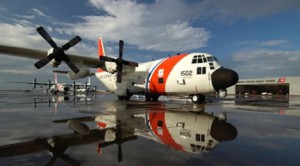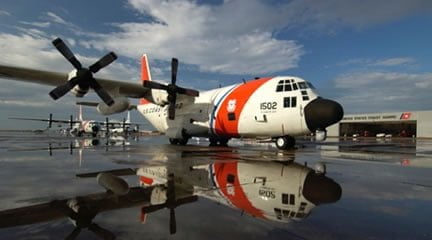08/27/2011 by Robbin Laird
The hurricane pounding the East Coast is a reminder of the reliance Americans have on the USCG for search, rescue and safety in extreme circumstances. But it is time to pay the USCG back for such centrality to the American way of life.
The entire USCG air fleet relies on Elizabeth City facilitates for logistics and support. Yet the Elizabeth City station remains of World War II vintage. It is a single point of failure for the entire USCG fleet and is extremely vulnerable during hurricanes.

In an interview we did last year with Captain Bennett, the head of the Elizabeth City facility outlined the problems.
SLD: When you showed me all the outdoor storage — things that are exposed outdoors, and the World War II structures. One of the things that folks should realize is this is hurricane country. And given that we’ve decided to consolidate all of our aircraft support structure here, one thing that would concern me is the need to improve from protection from just the high winds and the hurricanes in the area.
And so, it would be probably optimal if we had some new capacity here that was more state-of-the-art and also more hurricane protective.
Captain Bennett: Yes, that’s spot-on. We do have a lot of sheds, as you mentioned, and equipment outside that should be properly secured and housed in substantial buildings. One of my initiatives when I got here was try to get rid of some of our sheds if we have a big blow here.
We’re working towards that, but it’s still been kind of slow going because we’ve grown a lot faster than we’ve been able to get the infrastructure there. So what we do is when we do have a threat of a hurricane, we do take some stuff inside, secure things as best we can. But it is a concern, because this is North Carolina and we have been known to get some pretty big hurricanes through here.
Ironically, as we discussed though, sometimes the aftermath of a hurricane will be bad that we lose equipment and may have building damage. We do typically get some supplemental funding, which will help in the rebuild.
We were able to reconstitute our waterfront on the Pasquotank River through the last major hurricane that we had, and we purchased new riprap and we also reroofed some of our buildings.
Lest one miss the point of why should vulnerabilities are important, Captain Bennett made it clear.
Essentially this is a World War II vintage base; it’s got a deep legacy here within the community in Elizabeth City. And it’s played a key role over the years since World War II. And really, any rescue that you see at sea or anything that the Coastguard’s doing out there on the high seas or picking up people locally in lakes, inland waterways, all that portion of the operations, you can reverse engineer from the operations to a base like Elizabeth City.
So that’s kind of the plus and minus of the hurricane season, but it’s certainly not the way to hope for hurricanes or whatever to get money to help recapitalize your base.we have kind of a FedEx approach to aircraft maintenance. Elizabeth City maintains all the aircraft in the whole United States Coastguard. This is the hub where it all happens, all the spare parts, all major maintenance comes through here, Elizabeth City, North Carolina.
And currently our warehouse, which has a lot of these spare parts, is in need of great repair; we have a crumbling floor right now, which we’re buttressing up. This part of the country, we’re close to the Dismal Swamp, we have a lot of underground water. Actually, the warehouse is on top of kind of an underground river.
So the floor is sagging, so we’re looking forward to getting a new warehouse so we can adequately house all of the spare parts and get a state-of-the-art warehousing.
Because if we have a failure here within Elizabeth City for the aircraft maintenance, it’ll affect the whole fleet throughout the Coastguard. We are a single point of failure. So that’s a huge infrastructure issue that we’re looking forward to working through.
But right now, we kind of a bridging strategy with a temporary fix on the floor, if you will.
And if one wonders how important the USCG can become in dealing with the impact of Hurricane Irene, one can look at this discussion by Rear Admiral Lee on the possible situation for the Outer Banks and the role of USCG assets in dealing with the situation.
http://www.navytimes.com/news/2011/08/military-coast-guard-irene-outer-banks-082711w/


